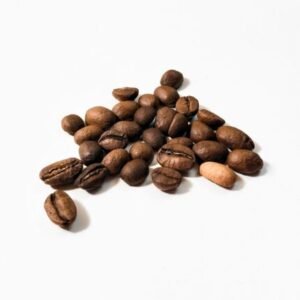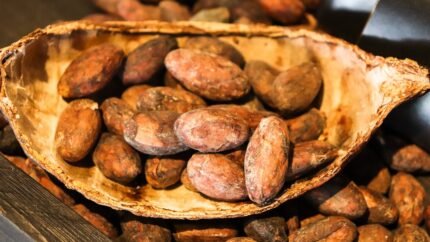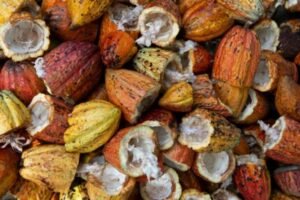Medically reviewed by Dr. Ramesh Gaddam, M.D. — Written by Sumalatha, D.N.H.E
Uses of Cacao
Cacao is a versatile ingredient used in various culinary and non-culinary applications due to its rich flavor, nutritional profile, and health benefits.

Here are some common uses of cacao:
Chocolate Production
Cacao is the primary ingredient in chocolate, including dark, milk, and white chocolate. The beans are processed to make cocoa mass, cocoa butter, and cocoa powder.
Baking
Cacao powder and cacao nibs are widely used in baking to make cakes, cookies, brownies, and other desserts.
Beverages
Cacao is used to make hot chocolate, cacao tea, and various cocoa-based drinks. It can also be added to smoothies for a rich chocolate flavor.
Snacks
Cacao nibs and chocolate bars are popular as snacks. Raw cacao beans can also be consumed directly as a nutritious snack.
Savory Dishes
Cacao is sometimes used in savory dishes, particularly in traditional Mexican cuisine, such as in mole sauce.
Cosmetics
Cocoa butter, extracted from cacao beans, is used in lotions, creams, and lip balms due to its moisturizing properties.
Aromatherapy
Cacao essential oil is used in aromatherapy for its pleasant scent and mood-enhancing properties.
Health Supplements
Cacao is used in dietary supplements for its high antioxidant content and potential health benefits.
Ceremonial Uses
In some cultures, cacao is used in traditional ceremonies and rituals due to its historical and cultural significance.
Cacao’s diverse applications make it a valuable ingredient in both food and non-food products, enhancing flavor, nutrition, and well-being.
Side Effects of Cacao
While cacao offers numerous health benefits, it can also have some side effects, especially when consumed in large amounts.

Here are some potential side effects of cacao:
Caffeine Sensitivity
Cacao contains caffeine and theobromine, which can cause side effects such as:
- Insomnia
- Nervousness
- Increased heart rate
- Anxiety
Allergic Reactions
Some individuals may experience allergic reactions to cacao, resulting in:
- Skin rashes
- Itching
- Digestive issues
Gastrointestinal Issues
Consuming large amounts of cacao can lead to gastrointestinal problems, including:
- Nausea
- Diarrhea
- Abdominal discomfort
Kidney Concerns
Cacao is high in oxalates, which can contribute to the formation of kidney stones in susceptible individuals.
Migraine Triggers
Cacao may trigger migraines in some people due to the presence of tyramine and phenylethylamine.
Weight Gain
Excessive consumption of cacao products, particularly those high in sugar and fat (like chocolate), can lead to weight gain and related health issues.
Interference with Calcium Absorption
The high oxalate content in cacao can interfere with calcium absorption, potentially affecting bone health if consumed in very large quantities over time.
Increased Heart Rate and Palpitations
Due to its stimulant effects, excessive intake of cacao can cause heart palpitations and increased heart rate.
Interaction with Medications
Cacao can interact with certain medications, including antidepressants (particularly MAO inhibitors), leading to potential side effects or reduced efficacy of the medication.
It’s important to consume cacao in moderation and be mindful of individual sensitivities and health conditions.
If you experience any adverse effects, it may be best to reduce your intake or consult a healthcare professional.
Cacao Benefits for Male
Cacao offers several health benefits specifically for men, thanks to its rich nutrient profile and bioactive compounds.

Here are some notable benefits:
Improved Cardiovascular Health
Cacao is rich in flavonoids, which can improve blood flow, reduce blood pressure, and lower the risk of cardiovascular diseases.
This is particularly beneficial for men, who are at a higher risk for heart conditions as they age.
Enhanced Athletic Performance
The magnesium and other minerals in cacao can help improve muscle function and recovery, enhancing overall athletic performance and reducing muscle cramps.
Boosted Libido and Sexual Health
Cacao contains compounds that can improve mood and increase blood flow, which may enhance libido and sexual performance.
The presence of phenylethylamine (PEA) can also stimulate the release of endorphins and promote a sense of well-being.
Cognitive Function and Mental Health
Flavonoids in cacao have been shown to improve cognitive function, memory, and focus.
Regular consumption can help reduce the risk of neurodegenerative diseases and improve overall mental health.
Anti-Inflammatory and Antioxidant Effects
Cacao’s high antioxidant content helps fight oxidative stress and inflammation, reducing the risk of chronic diseases and promoting overall health.
Weight Management
The high fiber content in cacao can help control appetite and support weight management, which is beneficial for maintaining a healthy body weight.
Muscle Recovery
The anti-inflammatory properties of cacao can aid in muscle recovery post-exercise, reducing soreness and enhancing recovery time.
Improved Mood
Cacao stimulates the production of serotonin and endorphins, which can improve mood and combat stress and depression, contributing to better mental health and well-being.
Prostate Health
Some studies suggest that the antioxidants in cacao can support prostate health by reducing inflammation and oxidative stress, which are factors in prostate disease.
Bone Health
The magnesium and calcium in cacao are essential for maintaining strong bones, which is important for men as they age and become more susceptible to bone density loss.
Incorporating cacao into a balanced diet can help men enjoy these health benefits, contributing to overall well-being and vitality.
Cacao Benefits for Female
Cacao offers several health benefits for women, thanks to its rich nutrient profile and bioactive compounds.

Here are some notable benefits:
Cardiovascular Health
The flavonoids in cacao help improve blood flow, reduce blood pressure, and lower the risk of cardiovascular diseases, which is particularly beneficial for women as heart disease is a leading health concern.
Hormonal Balance
Cacao contains magnesium, which plays a crucial role in balancing hormones and can help alleviate symptoms of PMS and menopause, such as mood swings, cramps, and fatigue.
Skin Health
Cacao is rich in antioxidants, which can protect the skin from damage, improve hydration, and enhance skin texture. The anti-inflammatory properties can also help reduce acne and other skin issues.
Mood Enhancement
Cacao stimulates the production of endorphins and serotonin, promoting a sense of well-being and happiness, which can help combat stress, anxiety, and depression.
Cognitive Function
Flavonoids in cacao have been shown to improve cognitive function, memory, and focus, potentially reducing the risk of neurodegenerative diseases like Alzheimer’s.
Bone Health
The high magnesium content in cacao supports bone health, which is particularly important for women, who are at higher risk of osteoporosis as they age.
Weight Management
Cacao’s high fiber content can help control appetite, support weight management, and promote a healthy metabolism.
Anti-Inflammatory Effects
The polyphenols in cacao have anti-inflammatory properties that can help reduce chronic inflammation and associated diseases, promoting overall health and wellness.
Improved Sleep
Magnesium in cacao can help relax muscles and improve sleep quality, which is beneficial for women experiencing sleep disturbances.
Reproductive Health
Cacao’s nutrients can support reproductive health by providing essential vitamins and minerals needed for a healthy reproductive system.
Pregnancy Benefits
Cacao provides important nutrients like iron, magnesium, and antioxidants that can support a healthy pregnancy.
However, it should be consumed in moderation due to its caffeine content.
Incorporating cacao into a balanced diet can help women enjoy these health benefits, contributing to overall well-being and vitality.
Cacao Benefits for Pregnancy
Cacao can offer several health benefits during pregnancy, thanks to its rich nutritional content.

However, it’s important for pregnant women to consume cacao in moderation due to its caffeine content. Here are some notable benefits of cacao for pregnancy:
Rich in Antioxidants
Cacao is high in flavonoids, which are powerful antioxidants that help protect cells from damage and reduce inflammation, contributing to overall health during pregnancy.
Nutrient-Rich
Cacao provides essential nutrients, including:
- Iron: Important for preventing anemia, which is common during pregnancy.
- Magnesium: Helps with muscle relaxation, reduces the risk of cramps, and supports overall fetal development.
- Calcium: Essential for the development of strong bones and teeth in the baby.
- Potassium: Helps maintain fluid and electrolyte balance in the body.
Improved Mood
Cacao stimulates the production of endorphins and serotonin, which can improve mood and help combat stress, anxiety, and depression, common concerns during pregnancy.
Cardiovascular Health
The flavonoids in cacao can improve blood flow, lower blood pressure, and support cardiovascular health, which is crucial during pregnancy as the heart works harder to pump blood.
Digestive Health
Cacao’s high fiber content can help prevent constipation, a common issue during pregnancy, by promoting healthy digestion and regular bowel movements.
Potential Reduced Risk of Preeclampsia
Some studies suggest that moderate consumption of dark chocolate, which contains cacao, may reduce the risk of preeclampsia, a condition characterized by high blood pressure during pregnancy.
Immune Support
Cacao contains zinc, which supports the immune system, helping to protect both the mother and baby from infections.
Energy Boost
The natural stimulant effects of cacao, due to its theobromine content, can provide a gentle energy boost, helping to combat pregnancy-related fatigue.
Cognitive Benefits
The antioxidants in cacao can support brain health and cognitive function, potentially benefiting both the mother and the developing baby.
Skin Health
Cacao’s antioxidants can help improve skin elasticity and hydration, potentially reducing the occurrence of stretch marks during pregnancy.
Moderation is Key
While cacao offers these benefits, it’s important for pregnant women to consume it in moderation due to its caffeine content. Excessive caffeine intake during pregnancy can lead to complications such as low birth weight or preterm birth.
Consulting a healthcare provider is recommended to ensure cacao is consumed safely during pregnancy.
Incorporating moderate amounts of cacao into a balanced diet can help pregnant women enjoy these benefits, contributing to a healthier pregnancy.
Cacao Benefits for Skin
Cacao Benefits for Hair
Cacao offers several benefits for hair health due to its rich nutrient profile and bioactive compounds.

Here are some notable benefits:
Scalp Health
Cacao contains antioxidants and anti-inflammatory properties that promote a healthy scalp by reducing inflammation, soothing irritation, and combating free radicals that can damage hair follicles.
Improved Hair Growth
The nutrients in cacao, such as magnesium, copper, and zinc, support hair growth by nourishing the scalp, stimulating blood circulation, and promoting the production of keratin, the protein that makes up hair strands.
Hair Strength and Thickness
Cacao is rich in sulfur, which is essential for the formation of strong and healthy hair.
Sulfur helps strengthen hair follicles, prevent hair breakage, and improve overall hair thickness and density.
Hydration and Moisture
Cacao butter, derived from cacao beans, is an excellent natural moisturizer for hair.
It helps to hydrate dry and brittle hair, seal in moisture, and restore elasticity, leaving hair soft, smooth, and manageable.
Reduced Hair Loss
The antioxidants in cacao can help protect hair follicles from damage caused by free radicals and oxidative stress, reducing the risk of hair loss and promoting healthier hair growth.
Shine and Luster
Cacao butter and cacao oil add shine and luster to hair by forming a protective barrier that seals the hair cuticle, smooths frizz, and reflects light, resulting in glossy, radiant hair.
Improved Texture
Cacao contains vitamins and minerals that nourish and condition the hair, improving its overall texture, softness, and silkiness.
Stress Reduction
Cacao contains compounds that promote relaxation and reduce stress, which can indirectly benefit hair health by minimizing stress-related hair issues like hair loss and breakage.
Protection from Environmental Damage
The antioxidants in cacao help protect hair from environmental damage caused by pollution, UV radiation, and harsh weather conditions, preserving its strength, color, and vitality.
Application Methods
Cacao can be incorporated into hair care products or used directly on the hair and scalp in various ways:
- Cacao Butter: Used as a deep conditioning treatment or leave-in conditioner to moisturize and nourish the hair.
- Cacao Oil: Applied as a scalp massage oil or hair oil treatment to stimulate circulation and promote hair growth.
- Cacao Powder: Mixed with other natural ingredients to create homemade hair masks or scrubs for scalp exfoliation and hair revitalization.
Incorporating cacao into your hair care routine can help promote healthier, stronger, and more beautiful hair.
Cacao Benefits for Diabetes
Cacao can offer several potential benefits for individuals with diabetes, primarily due to its low glycemic index and rich nutritional profile.

Here are some notable benefits:
Blood Sugar Regulation
Cacao has a low glycemic index, meaning it causes a slower and steadier increase in blood sugar levels compared to high-glycemic foods.
This can help prevent rapid spikes and dips in blood sugar, making it suitable for diabetes management.
Improved Insulin Sensitivity
Some studies suggest that the flavonoids in cacao may improve insulin sensitivity, allowing cells to better respond to insulin and regulate blood sugar levels more effectively.
Heart Health
Cacao is rich in flavonoids, which have been associated with a reduced risk of cardiovascular diseases, such as heart disease and stroke, common complications of diabetes.
Reduced Inflammation
The anti-inflammatory properties of cacao can help reduce inflammation in the body, which is often elevated in individuals with diabetes and linked to complications such as cardiovascular disease and nerve damage.
Weight Management
Cacao’s high fiber content can help promote satiety, control appetite, and aid in weight management, which is important for individuals with diabetes as excess weight can exacerbate symptoms and complications.
Antioxidant Protection
Cacao is rich in antioxidants, which help protect cells from damage caused by oxidative stress.
This can help reduce the risk of diabetes-related complications, such as nerve damage and kidney disease.
Improved Mood and Well-being
Cacao contains compounds that stimulate the production of endorphins and serotonin, which can improve mood and reduce stress, contributing to overall well-being, important for individuals managing diabetes.
Application Methods
Cacao can be incorporated into the diet in various forms, including:
- Dark Chocolate: Choose dark chocolate with a high cocoa content (70% or higher) and minimal added sugars.
- Cacao Powder: Use unsweetened cacao powder in recipes for baking, smoothies, or hot cocoa.
- Cacao Nibs: Add cacao nibs to yogurt, oatmeal, or trail mix for a nutritious and low-sugar snack option.
While cacao can offer benefits for individuals with diabetes, it’s essential to consume it in moderation and be mindful of portion sizes, particularly with chocolate products that may contain added sugars and fats.
Consulting a healthcare provider or registered dietitian is recommended for personalized dietary recommendations.
Cacao Benefits for Fertility
Cacao may offer several potential benefits for fertility, primarily due to its rich nutrient profile and bioactive compounds.
While more research is needed to fully understand its effects on fertility, here are some notable benefits:

Improved Blood Flow
Cacao contains flavonoids that can help improve blood circulation, including blood flow to reproductive organs.
Enhanced circulation can support reproductive health by ensuring adequate blood supply to the ovaries and uterus.
Hormonal Balance
Cacao contains magnesium, which plays a crucial role in hormone regulation.
Maintaining proper hormone balance is essential for fertility, as imbalances can affect ovulation, menstrual cycles, and overall reproductive health.
Stress Reduction
Cacao contains compounds that promote relaxation and reduce stress, such as theobromine and phenylethylamine.
Lower stress levels can have a positive impact on fertility by reducing cortisol levels and supporting a healthy reproductive system.
Antioxidant Protection
Cacao is rich in antioxidants, including flavonoids and polyphenols, which help protect cells from oxidative damage.
This antioxidant protection may support fertility by preserving the health of eggs and sperm and reducing the risk of DNA damage.
Mood Enhancement
Cacao stimulates the production of endorphins and serotonin, neurotransmitters that promote feelings of well-being and happiness.
Improved mood and reduced stress can positively influence fertility by creating a more conducive environment for conception.
Nutrient Support
Cacao is a good source of essential nutrients like iron, zinc, and folate, which are important for reproductive health.
These nutrients play roles in hormone production, egg quality, and sperm development, all of which are critical for fertility.
Aphrodisiac Properties
Cacao has a long history as an aphrodisiac, believed to enhance libido and sexual desire.
While scientific evidence is limited, the mood-enhancing effects of cacao may contribute to increased sexual arousal and enjoyment.
Application Methods
Cacao can be incorporated into the diet in various forms, including:
- Dark Chocolate: Choose dark chocolate with a high cocoa content (70% or higher) and minimal added sugars for maximum health benefits.
- Cacao Powder: Use unsweetened cacao powder in recipes for baking, smoothies, or hot cocoa.
- Cacao Nibs: Add cacao nibs to yogurt, oatmeal, or trail mix for a nutritious and fertility-friendly snack option.
While cacao may offer benefits for fertility, it’s essential to consume it as part of a balanced diet and lifestyle.
Individuals trying to conceive should consult with a healthcare provider for personalized recommendations and guidance.
Frequently Asked Questions
Users frequently searched questions related to cacao are:
What does cacao do for men?
Cacao offers several health benefits for men, including improved cardiovascular health, enhanced athletic performance, boosted libido and sexual health, cognitive function enhancement, and support for overall well-being.
Is cacao good for sperm?
Cacao’s antioxidant properties may support sperm health by protecting against oxidative damage.
Additionally, the nutrients in cacao, such as zinc and magnesium, are important for sperm production and motility.
Is it OK to drink cacao powder everyday?
Moderate consumption of cacao powder is generally safe for most people.
However, excessive intake may lead to unwanted side effects due to its caffeine and theobromine content.
It’s essential to consume it in moderation as part of a balanced diet.
What are the benefits of 100% cacao powder?
100% cacao powder is rich in antioxidants, minerals, and flavonoids, offering benefits such as improved heart health, enhanced cognitive function, better mood, and support for overall health and well-being.
How much cacao per day?
The optimal amount of cacao per day varies depending on individual factors such as age, health status, and dietary preferences.
However, consuming 1-2 ounces (30-60 grams) of dark chocolate or 1-2 tablespoons of cacao powder daily is generally considered beneficial.
Is 100% cacao powder healthy?
Yes, 100% cacao powder is healthy as it contains no added sugars or fats and is rich in antioxidants, minerals, and other beneficial nutrients.
It can support heart health, cognitive function, and overall well-being when consumed as part of a balanced diet.
Which cacao powder is best?
The best cacao powder is one that is organic, non-GMO, and minimally processed.
Look for products labeled as 100% cacao or raw cacao powder to ensure you’re getting the purest form of cacao without any additives.
How much pure cacao powder per day?
The recommended amount of pure cacao powder per day is 1-2 tablespoons, which can be added to smoothies, oatmeal, or baked goods.
It’s important to consume it in moderation to avoid excessive intake of caffeine and theobromine.
Is cacao good for skin?
Yes, cacao is good for the skin due to its antioxidant properties, which help protect against oxidative damage and promote skin health.
It can improve hydration, reduce inflammation, and enhance overall skin texture and appearance.
Is cacao good for hair?
Yes, cacao can benefit hair health by improving blood circulation to the scalp, providing essential nutrients for hair growth, strengthening hair follicles, and promoting shiny, healthy-looking hair.
What are the side effects of cacao?
Potential side effects of cacao include caffeine sensitivity, allergic reactions, gastrointestinal issues, migraines, weight gain, interference with calcium absorption, increased heart rate, and interaction with certain medications.
How to use cacao for face?
Cacao can be used for the face by creating homemade face masks or scrubs using cacao powder mixed with ingredients like honey, yogurt, or avocado. Apply the mixture to clean skin, leave it on for 10-15 minutes, then rinse off with warm water.
Can I rub cocoa powder on my face?
Yes, cocoa powder can be used as a natural face mask by mixing it with water or other ingredients to form a paste.
Apply the mixture to the face, let it sit for 10-15 minutes, then rinse off with warm water for smooth, glowing skin.
Does cacao make you look younger?
Cacao’s antioxidant properties can help reduce the signs of aging by protecting the skin from damage caused by free radicals and promoting collagen production, resulting in smoother, more youthful-looking skin.
Is cocoa good for skin whitening?
Cocoa can help improve skin tone and texture, but it does not have significant skin whitening effects.
However, it can promote overall skin health and reduce the appearance of dark spots and uneven pigmentation over time.
How to use cacao powder for skin?
Cacao powder can be used for the skin by mixing it with other ingredients like yogurt, honey, or coconut oil to create homemade face masks, scrubs, or bath soaks.
These DIY treatments can help hydrate, nourish, and rejuvenate the skin.
Does cocoa make skin glow?
Yes, cocoa can make the skin glow by improving circulation, promoting collagen production, and providing antioxidants that help protect against environmental damage, resulting in a healthy, radiant complexion.
How to use cocoa powder for skin whitening overnight?
While cocoa powder is not a quick-fix solution for skin whitening, it can help improve skin tone and texture over time.
Mix cocoa powder with yogurt or honey to form a paste, apply it to the skin before bed, and rinse off in the morning for smoother, brighter-looking skin.
Also Read:
101 Health Benefits of Cinnamon for Skin, Hair and More
11 Potential Health Benefits of Cantaloupe & [Side Effects]
Medically reviewed by Dr. Ramesh Gaddam, M.D.

General Physician, Diabetologist, and Critical Care Specialist.
Discover more from Health Build-Up
Subscribe to get the latest posts sent to your email.


